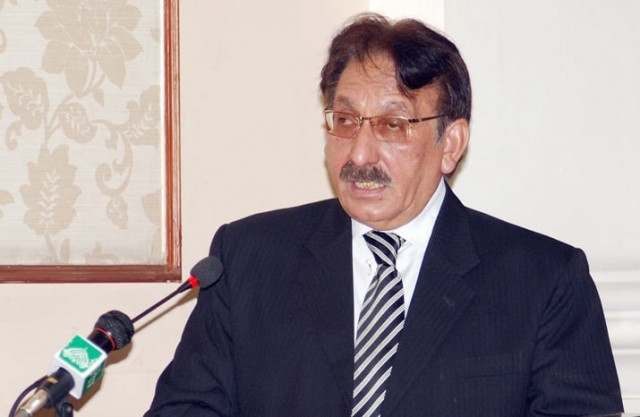Opinions vary on Justice Chaudhry’s legacy
Chaudhry did not appear at the event on what could have been his first public appearance since his retirement.

Former chief justice Iftikhar Muhammad Chaudhry. PHOTO: RIAZ AHMED/EXPRESS
Mixed opinions were shared by audience members and speakers alike at a panel discussion on the legacy of the former chief justice of Pakistan Iftikhar Muhammad Chaudhry here on Sunday.
Chaudhry did not appear at the event on what could have been his first public appearance since his retirement.
Prominent lawyers, Hamid Khan and Faisal Siddiqui along with Moeen Cheema and Ijaz Shafi Gilani analysed the legacy of the former CJP, which has polarised debate on the role of the higher judiciary.
Authors of the of the book, “The Politics and Jurisprudence of the Chaudhry Court 2005-2013”, Cheema and Dr Gilani said Chaudhry’s tenure was characterised by extraordinary developments and great controversies in constitutional politics and the jurisprudence of the apex court.
“The book is not just about a collection of 300 cases of the former CJP. It is about the role of the Supreme Court in that particular period, which was fairly unique,” said Cheema.
For him, there are no apolitical courts and distinction can only be seen in terms of quiet courts and the other ones. He agreed to the notion that the apex courts should not be apolitical as whatever they reveal gives a chance for public debate.
Siddiqui said before making any criticism, one needed to understand why it all happened. For Siddiqui, dramatic events of March 9, 2007, made the judiciary realise that the old sources of power would not help anymore and that’s when they decided that source of judicial power would be public support. “Threat of public mobilisation helped the cause.”
“It was like… just forget about everything else, we’ll give you direct justice.” He added that a total of 200,000 appeals of suo motu were filed during Chaudhry’s period.
He credited Chaudhary on issues such as accountability of intelligence agencies, cases of missing persons, operation in Karachi and compensation to victims of the Baldia factory fire.
“Biggest compensation in the history of South Asia was paid to those factory victims,” he revealed.
Commenting on Chaudhry’s unconventional approach, Khan said lawyers and judges had always tried to stay away from controversies, but Chaudhry’s court “invited controversies”.
The CJP held inquiries and summoned whoever was responsible, he said, adding the lawyers and judges were not trained for it and that explains the outrage in some circles.
During the period, he made a common man believe that there was a court which was ready to listen to his/her problems and this was unprecedented, Khan said.
Despite his commendable efforts, Khan explained that the injustice prevailing in the country makes one think that ‘Chaudhary’s period was just a drop in the ocean.’ He did show a way but now it is back to square one. “Judiciary has serious limitations. Judiciary cannot bring all kinds of reforms,” he concluded.
“Too many laws, too little justice,” remarked an Indian citizen in the audience, following the discussion adding that lack of justice prevailed in both Pakistan and India.
Another foreigner commented that the independence of judiciary was of greater importance than it being popular. The audience also expressed dismay over the fact that Chaudhry failed when it came to issues such as the May 12 incident in Karachi, cases of missing persons, bringing reforms in the lower judiciary and providing social change.
Published in The Express Tribune, April 27th, 2015.





1724319076-0/Untitled-design-(5)1724319076-0-208x130.webp)













COMMENTS
Comments are moderated and generally will be posted if they are on-topic and not abusive.
For more information, please see our Comments FAQ